
JOURNAL OF WATERWAY PORT COASTAL AND OCEAN ENGINEERING
Scope & Guideline
Elevating Standards in Waterway and Coastal Management
Introduction
Aims and Scopes
- Hydrodynamic Modeling and Analysis:
The journal publishes research on the modeling of hydrodynamic processes, including waves, currents, and sediment transport, to understand their effects on coastal and marine structures. - Geotechnical Engineering in Marine Contexts:
Research exploring the geotechnical properties of sediments in marine environments, including sediment stability, scour processes, and foundation design for offshore structures. - Dredging Engineering and Sediment Management:
Focus on advancements in dredging techniques, sediment transport modeling, and the management of dredged materials to enhance navigability and ecological health of waterways. - Coastal Resilience and Climate Change Adaptation:
Studies addressing the impacts of climate change on coastal environments, including the design of resilient infrastructure and strategies for mitigating flood risks. - Innovations in Waterway Infrastructure:
Research on the design, optimization, and performance of waterway infrastructure, including ports, navigation channels, and flood defense systems. - Environmental Impacts of Marine Engineering:
Investigations into the ecological effects of engineering interventions in marine environments, focusing on biodiversity, habitat preservation, and sustainable practices.
Trending and Emerging
- Machine Learning and Data-Driven Approaches:
The incorporation of machine learning techniques for predictive modeling, particularly in sediment transport and hydrodynamic forecasting, is gaining traction as researchers seek to leverage large datasets for improved decision-making. - Nature-Based Solutions for Coastal Protection:
There is an increasing emphasis on using nature-based solutions, such as living shorelines and vegetative buffers, to enhance coastal resilience and sustainability, reflecting a broader trend towards environmentally friendly engineering practices. - Integrated Coastal Zone Management (ICZM):
Research focusing on the holistic management of coastal zones is on the rise, emphasizing the need for coordinated strategies that address ecological, social, and economic dimensions. - Impact of Climate Change on Marine Systems:
The consideration of climate change impacts on marine and coastal systems is becoming more prominent, with studies exploring adaptation strategies and resilience-building measures. - Advanced Numerical Simulations and Hybrid Modeling:
The use of advanced numerical simulations and hybrid modeling approaches to analyze complex interactions between hydrodynamics, sediment transport, and structural responses is increasingly prevalent.
Declining or Waning
- Traditional Coastal Erosion Studies:
There has been a noticeable decrease in studies focused solely on traditional coastal erosion methods, as newer approaches and technologies are emerging that integrate multiple factors affecting coastal dynamics. - Basic Hydrodynamic Theory Applications:
Research applying basic hydrodynamic theories without incorporating modern computational techniques or environmental variables appears to be waning, as the field moves towards more complex and integrated modeling approaches. - Static Structural Analysis of Marine Structures:
The focus on static analysis of marine structures is diminishing in favor of more dynamic assessments that consider the effects of variable environmental conditions such as storms and climate change. - Single-Factor Environmental Impact Assessments:
There is a decline in studies that evaluate the environmental impacts of marine engineering projects based on single factors, as there is a growing recognition of the need for multi-faceted assessments.
Similar Journals
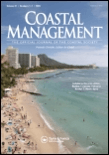
COASTAL MANAGEMENT
Bridging theory and practice in coastal management.COASTAL MANAGEMENT is a distinguished journal published by Taylor & Francis Inc, specializing in the interdisciplinary field of environmental science with a focus on coastal ecosystems. Since its inception in 1987, this journal has provided a critical platform for researchers and practitioners to disseminate innovative studies and practical solutions related to coastal management challenges. With an impressive Q2 ranking in both Environmental Chemistry and Environmental Science categories, it is recognized for its significant contributions to the field, evidenced by its Scopus ranking of #61/233 in General Environmental Science and #60/147 in Environmental Chemistry. Although open access options are not available, the journal maintains a broad readership within the academic community through its comprehensive exploration of coastal issues. With a commitment to advancing knowledge and fostering collaboration among experts, COASTAL MANAGEMENT plays a pivotal role in shaping sustainable practices and policies essential for the conservation and stewardship of our vital coastal environments.
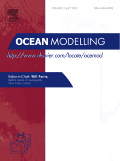
OCEAN MODELLING
Transforming Ocean Research with Cutting-Edge Techniques.OCEAN MODELLING, published by Elsevier Science Ltd, is a leading journal dedicated to advancing the understanding of ocean systems through innovative modeling techniques and interdisciplinary research. With an ISSN of 1463-5003 and E-ISSN 1463-5011, this journal is esteemed within the fields of Atmospheric Science, Computer Science (Miscellaneous), Geotechnical Engineering and Engineering Geology, and Oceanography, as reflected by its impressive quartile rankings in 2023, including Q1 in Oceanography and Q1 in Computer Science. Researchers and professionals benefit from the journal’s high-impact contributions, as indicated by Scopus rankings that place it among the top-tier publications in its categories. Although not an open-access journal, OCEAN MODELLING provides essential insights and methodologies crucial for both academic and practical applications, facilitating knowledge transfer and innovation among marine scientists, engineers, and policy-makers engaged in vital ecological studies and technological advancements regarding our oceans. Join the forefront of marine modeling research by contributing to and exploring the wealth of knowledge presented in OCEAN MODELLING.
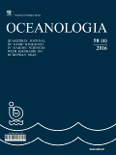
OCEANOLOGIA
Pioneering Insights in Ocean EngineeringOCEANOLOGIA, a distinguished academic journal published by the Polish Academy of Sciences, Institute of Oceanology, serves as a pivotal platform for researchers and professionals in the fields of Aquatic Science, Oceanography, and Ocean Engineering. Established in 1973 and transitioning to Open Access in 2011, this peer-reviewed journal promotes the dissemination of high-quality research across its diverse scope of ocean-related topics, aligning with its commitment to advancing marine science. With a notable impact factor underscored by its positioning in the Q1 and Q2 quartiles of recognized categories, OCEANOLOGIA stands out with impressive Scopus Rankings, including 49/247 in Aquatic Science and 24/105 in Ocean Engineering, reflecting its significance in the global research landscape. The journal's dedication to publishing cutting-edge studies ensures that it continues to influence both academic discourse and practical applications in ocean-related fields, making it an essential resource for students, researchers, and professionals aiming to contribute to the advancement of oceanic studies.

Ocean Systems Engineering-An International Journal
Advancing Knowledge in Ocean Systems and Environmental ScienceOcean Systems Engineering - An International Journal, published by TECHNO-PRESS, is a pivotal platform for the dissemination of cutting-edge research in the fields of Automotive Engineering, Mechanical Engineering, Ocean Engineering, and Water Science and Technology. With its ISSN 2093-6702 and E-ISSN 2093-677X, the journal serves as a key resource for scholars and practitioners alike, offering insights into innovative solutions and advancements within these disciplines. Operating under a Q3 ranking in several categories including Automotive and Ocean Engineering, the journal showcases research that significantly contributes to both theoretical and practical aspects of engineering and environmental science. Although it does not currently offer an open-access model, the journal maintains an active presence in the academic community, supported by a dedicated readership keen on exploring the latest developments from 2017 to 2024. Situated in South Korea, it is uniquely positioned to bridge international research efforts and enhance collaborative studies aimed at addressing critical ocean-related challenges.

International Journal of Marine and Coastal Law
Fostering Dialogue on Contemporary Marine Legal ChallengesThe International Journal of Marine and Coastal Law, published by Martinus Nijhoff Publishers, is a leading academic periodical dedicated to the exploration of legal aspects related to marine and coastal environments. With a strong emphasis on interdisciplinary research, this journal serves as a vital resource for scholars, practitioners, and policymakers engaged in areas such as environmental science, oceanography, and law. Since its inception in 1986, the journal has continuously evolved to address contemporary challenges in the field, boasting a commendable Q2 ranking in Law and Q3 rankings across various relevant categories. The journal facilitates rigorous discourse on pressing issues, providing a platform for high-quality research that aims to inform legal frameworks and enhance sustainable practices. Although it does not offer open access, the journal’s impact extends to its notable Scopus rankings and its essential role in shaping legal discourse on marine and coastal management. Researchers and professionals will find invaluable insights and scholarly contributions that are crucial for advancing knowledge and policy in this critical area of study.

GEO-MARINE LETTERS
Unveiling the Secrets of Earth’s Marine EcosystemsGEO-MARINE LETTERS, published by Springer, is a prestigious academic journal that has been a pivotal platform for the dissemination of innovative research in the fields of Earth and Planetary Sciences, Oceanography, Environmental Science, and Geotechnical Engineering since its inception in 1981. With an E-ISSN of 1432-1157, this journal has established itself in the Q2 quartile across multiple categories in 2023, indicating its influential position within the scientific community, as reflected by its Scopus rankings. While it currently does not offer an open access option, its rigorous peer-review process ensures the publication of high-quality research that contributes significantly to advancing our understanding of marine and geological sciences. Researchers, professionals, and students alike will benefit from the diverse scope of studies featured in GEO-MARINE LETTERS, making it an essential resource for those engaged in environmental and marine research. Situated in Germany, the journal's commitment to excellence continues to shape critical discussions and innovations in the field.
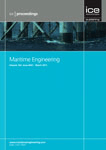
PROCEEDINGS OF THE INSTITUTION OF CIVIL ENGINEERS-MARITIME ENGINEERING
Connecting Professionals through Cutting-edge Maritime Research.PROCEEDINGS OF THE INSTITUTION OF CIVIL ENGINEERS-MARITIME ENGINEERING, published by Emerald Group Publishing Ltd, is a leading journal in the field of Maritime Engineering. With a reputable ISSN of 1741-7597 and an E-ISSN of 1751-7737, this journal has established itself as a cornerstone for researchers, professionals, and students keen to explore the complexities of ocean engineering. Operating primarily from the United Kingdom, it has made significant contributions to the advancement of the maritime industry since its inception, covering research from 2001 to 2024. The journal currently holds a Q3 ranking in Ocean Engineering as classified by Scopus, where it ranks 21st among 105 journals in the category, placing it in the 80th percentile, which highlights its influence and relevance in contemporary marine research. Through a rigorously peer-reviewed process, the journal publishes innovative and high-quality articles that encompass broad aspects of maritime engineering, including design, construction, and sustainability, thus serving as a vital resource for those engaged in this dynamic field. By fostering dialogue among professionals and providing access to cutting-edge research, the PROCEEDINGS OF THE INSTITUTION OF CIVIL ENGINEERS-MARITIME ENGINEERING continues to shape the future of maritime engineering practice and education.

Pomorstvo-Scientific Journal of Maritime Research
Navigating the Future of Maritime ResearchPomorstvo-Scientific Journal of Maritime Research, published by the University of Rijeka's Faculty of Maritime Studies, serves as a vital platform in the fields of maritime studies and related disciplines. With an Open Access policy established since 2006, this journal fosters the dissemination of peer-reviewed research covering a diverse range of topics within Engineering, Geography, Ocean Engineering, and Social Sciences, making it an essential resource for researchers, professionals, and students alike. As of 2023, it holds a commendable profile with Q3 rankings in multiple categories, including Engineering and Geography, highlighting its ongoing commitment to quality scholarship. Accessible from Croatia, and included in Scopus with significant rankings, the journal aims to promote innovative and practical maritime research, contributing significantly to the advancement of knowledge and policy within the maritime community.
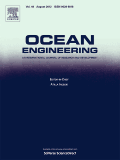
Ocean Engineering
Delivering Insights for a Sustainable Ocean FutureOcean Engineering, published by PERGAMON-ELSEVIER SCIENCE LTD, is a prestigious peer-reviewed journal that has been at the forefront of marine sciences since its inception in 1968. With an impressive impact factor and recognition in the Q1 quartile of both Environmental Engineering and Ocean Engineering, it stands as a key resource for researchers, professionals, and students alike. This journal focuses on a wide range of topics relevant to the field, including coastal engineering, marine resource management, and ocean dynamics, aiming to bridge theoretical research and practical applications. As ranked 14th in Ocean Engineering according to Scopus, it reflects the influential contributions of its articles and provides a platform for innovative discoveries that advance the field. Although not open-access, it offers diverse subscription options for accessing cutting-edge research. The journal’s ongoing legacy of publishing high-quality research continues to contribute significantly to the advancement of knowledge in ocean-related engineering disciplines.

Journal of Ocean University of China
Pioneering Research to Harness Oceanic PotentialThe Journal of Ocean University of China, ISSN 1672-5182, is a premier academic journal dedicated to advancing the fields of Ocean Engineering and Oceanography. Published by the esteemed Ocean University of China, the journal serves as a vital platform for researchers, professionals, and students to disseminate groundbreaking findings and foster collaboration in marine science and engineering. With a commitment to quality, the journal currently holds a Q3 ranking in both Ocean Engineering and Oceanography as of 2023, indicating its significant contributions within the scientific community. The journal's scope encompasses a wide range of topics including marine technology, ecological studies, and coastal management, all aimed at enhancing the understanding and utilization of oceanic resources. Although currently not Open Access, it continues to attract submissions from renowned scholars, ensuring a diverse and innovative range of research. By providing access to cutting-edge research and practical insights, the Journal of Ocean University of China plays a critical role in shaping the future of ocean sciences and engineering.